Treatment Options for Wounds: What You Should Know
Wounds can happen at any time, from minor accidents to major surgery. Depending on the type you’re dealing with, there could be several treatment options for wounds available. These treatments can include proper cleaning, dressing, and medication. If not treated correctly, the wound could become infected, requiring urgent medical care to treat any complications.
At Fairview Rehab and Nursing Home in Queens NY, we offer complete wound care plans that may also include treatment for infectious diseases. These plans are patient-specific, so you get only the treatments required for your specific needs.
This information is strictly educational. Be sure to speak to your doctor to see if the following wound treatment options are right for you.

Some of the Treatment Options for Wounds
Wound treatments can vary, depending on the wound, though there are some basic treatments for all wounds. These may include cleaning the wound to remove dirt or debris and dressing the wound to keep it clean. Removing dead skin may also be necessary, as is closing any larger wounds with staples or stitches.
Controlling swelling is also part of wound care, as is maintaining the proper blood flow to speed up healing. For puncture wounds, a tetanus shot may be needed. You may even be required to use support socks or other aids, though this will be recommended by your doctor.
Those already on medication will likely have them reviewed. This will ensure that they don’t inhibit healing or negatively interact with new medications your doctor prescribes. Pain medications may also be recommended.
For more complicated wounds, your doctor may suggest specialized wound treatment options. These could include tissue grafts, surgery, or radiation treatments, depending on the wound or any underlying conditions you already have.
Treating infections
Infections are more common than you may think, even if you’ve taken excellent care of your wound. Some injuries are high risk for infection, so it is a good idea to monitor your wound carefully for such an issue. Part of your wound treatment options plan could include antibiotics to counter this possibility before any signs of infection are noted.
Those signs can include pus or pain at the wound site or fever. If you notice any of these issues, it is best to speak to a medical professional. They may prescribe antibiotics or the use of antimicrobial dressings to combat the infection. For more serious issues, surgery may be required to remove the infected tissue.
Treating other conditions related to wounds
If you’ve developed a condition related to your wound, your doctor may recommend some more serious treatment options for wounds. One complication that could arise is a staph infection. This is caused by staphylococcus bacteria that enter through the open wound. To treat this type of infection, antibiotics will be administered.
Clostridium tetani is another possible issue. This causes tetanus, which can lead to muscle spasms in your neck and jaw that are quite painful. A tetanus shot can treat this issue.
Another possible condition is necrotizing fasciitis, though this bacterial infection is quite rare. Left untreated it can lead to serious issues.
This article contains informational and educational materials and does not replace health or medical advice. For questions or concerns regarding your medical condition or health objectives, speak to a qualified physician or healthcare provider.






Leave A Comment